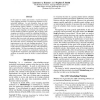Free Online Productivity Tools
i2Speak
i2Symbol
i2OCR
iTex2Img
iWeb2Print
iWeb2Shot
i2Type
iPdf2Split
iPdf2Merge
i2Bopomofo
i2Arabic
i2Style
i2Image
i2PDF
iLatex2Rtf
Sci2ools
AIPS
2004
2004
Task Swapping for Schedule Improvement: A Broader Analysis
In this paper we analyze and extend a recently developed "task-swapping procedure" for improving schedules in oversubscribed situations. In such situations, there are tasks which cannot be directly added to the current schedule without introducing capacity conflicts. A schedule is improved if one or more of these tasks can be feasibly included, and the goal of task swapping is to rearrange some portion of the current schedule to make this possible. Key to effective task swapping is an ability to exploit the scheduling flexibility inherent in the constraints associated with various scheduled tasks, and previous work has shown that the use of retraction heuristics that favor tasks with greater rescheduling flexibility can give rise to strong schedule improvement capabilities. We extend this work by developing and evaluating several improvements to the core task swapping procedure. We introduce three pruning techniques and show that each significantly improves computational eff...
Related Content
| Added | 30 Oct 2010 |
| Updated | 30 Oct 2010 |
| Type | Conference |
| Year | 2004 |
| Where | AIPS |
| Authors | Laurence A. Kramer, Stephen F. Smith |
Comments (0)

